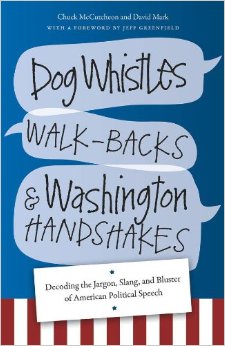Talking — and Writing about — Politics

Have you ever been engaged in a political conversation and found yourself wondering what someone meant when they mentioned “dog whistles,” “walk-backs” or “Washington handshakes”? If so, you’re not alone. And thanks to journalists Chuck McCutcheon and David Mark, co-authors of “Dog Whistles, Walk-Backs and Washington Handshakes: Decoding the Jargon Slang and Bluster of American Political Speech,” you don’t have to remain in the dark much longer. (And for those who do know what’s what when it comes to political slang, if you find a key political term missing from the book, go to the the Dog Whistles web site and let the authors know!) Below, we talk with the authors.
Let’s start with the obvious question. Would you please define “dog whistles, “walk-backs” and “Washington handshakes?”
Yes, “dog whistles” refers to political messaging using coded language that seems to mean one thing to the general population, but which to a targeted subgroup means something else entirely.
Then-President George W. Bush, for instance, was seen – by critics – as using coded language when appealing to evangelical voters. One example was “wonder-working power,” which is from a hymn. More recently, Sen. Rand Paul of Kentucky – and likely 2016 Republican presidential candidate – has been referring to obscure economists and other admired figures in libertarian circles.
“Walk-backs” are attempts by politicians and press handlers to limit the damage done by dumb, embarrassing and controversial statements. Senate Majority Leader Harry Reid is one of the kings of walk-backs. Throughout the years the Nevada Democrat’s staff has walked back many of his more controversial statements, such as when he was told in 2008 that insurance companies were in financial distress and he promptly said one company was on the verge of going bankrupt – a pronouncement that caused insurance stocks to plummet.
And “Washington handshakes” is an only-in-D.C. routine in which somebody shakes hand while looking over his or her shoulder to see if there could be a more important person in the room.
In his heyday, former House Speaker Newt Gingrich was known as king of the Washington handshake. That contrasted sharply with President Bill Clinton, Gingrich’s political rival, who could look everyone he greeted in the eye and make them feel like the most important person in the world.
Why did you decide to write “Dog Whistles” and why do it as a team?
We liked the idea of bringing together our knowledge and editorial skills on a topical political subject. We have both covered members of Congress and other elected officials extensively. In talking over potential topics, we realized there was a lot to be explained to the public about political speech that could be done in both a humorous and informative way.
Your book is very readable and often quite funny. So, with apologies to Daniel Webster, how did you keep it from becoming just another dry, boring dictionary?
That is precisely what we were trying to avoid. Many political science books treat the subject as just that – a science. We wanted to make this a book accessible to political junkies and those casually interested in politics. We aimed to find definitions for the book that were both well-known and somewhat obscure. We noticed that many of these terms are rarely uttered outside of Capitol Hill news conferences. We wanted to explain why a C-SPAN viewer might keep hearing the same phrases used by members of both parties. We also wanted to avoid parliamentary legislative terms like “cloture” and “motion to recommit.” There are other dictionaries for that.
The book is divided into six sections (Personalities; Expressions; People, Places & Things; Legislation; Campaigns/Elections, and Media/Scandals). How did you choose those categories and do you have a favorite?
We decided to focus on the settings in which politicians are usually speaking to the public, in a speech or on-camera. The legislative arena has its own parlance, naturally. But many of the other categories could have taken in terms that appear elsewhere.
One of the biggest challenges in putting together this book was figuring out which chapters certain terms should go in. And ensuring that the chapters were roughly the same length.
Is the manipulation of language in an effort to express/frame a political perspective/agenda a recent phenomenon or has it been going on for a long time?
Manipulation of political language has played a prominent role in American democracy since the outset of the Republic. But it’s been raises to a high art form during the internet era, when key words and phrases and go viral.
The nation’s early presidential races, between John Adams, Thomas Jefferson and other rivals included slurs tying opponents to the monarchies in Great Britain, France and other European power – sensitive issues at the time, only a few years after independence.
In the 1840 presidential election, “Tippecanoe and Tyler Too” was an early form of mass marketing. Throughout the 19th century newspaper – then the dominant form of political communication – included carefully-targeted phrases to rally supporters and impress independent voters.
Nowadays, press operations by members of Congress will seek to add words to the political conversation that embolden their own agendas.
What are some of the funnier and/or more bizarre entries in the book?
Our agreed-upon favorite is my good friend. As we write in the book, it’s “politician-speak for somebody they often can’t stand.” It’s particularly amusing to watch House floor debates when it’s quite likely members – referring to themselves as “friends” – don’t even know each other, in a chamber of 435 people.
Another favorite is “I say this in sorrow, not anger,” which is meant to create the impression that the person saying it is actually a nice person and that he or she is being forced to utter such harsh criticisms.
Were there any entries that you had to think about twice before including them in the book, and if so, what were your concerns?
One of the toughest challenges was trying to figure out something new to say about the more well-known terms. Including Pork, Revolving Door, Class Warfare, and Hawks. We’re both confident and proud that we were able to include revelatory explanations and analysis of these familiar phrases, but it took some work.
Are there any terms you left out that you now wish you had included?
Inevitably, each campaign season generates new words and phrases that become part of the political lexicon. One of the top ones for 2014 was Cantored – a reference to the shocking Republican primary loss in June by House Majority Leader Eric Cantor. The book does include the term Primaried, so we’ve got the subject covered.
The good news is that we’re updating fresh terms regularly on www.dogwhistlebook.com. Other new entries include Cone of Silence and Low-Informative Voters.
Based on your keen observations of politics and elections, do you have any predictions about the types of words/terms/phrases that may appear in the future?
It will be interesting to see if more phrases get named after elected officials, or former elected officials, such as Cantor. This has happened to a degree with recent years with figures like 2012 Missouri Republican Senate candidate Todd Akin, of “legitimate rape” infamy.
What do you hope people will take away from reading “Dog Whistles”?
That so much of the language used by politicians is deliberate. The better ones know how to make it sound like they’re talking off-the-cuff, when really have a specific, partisan agenda, in mind.
 David Mark is a seasoned political journalist, author and public speaker. Most recently he served as editor-in-chief of Silicon Valley-based Politix. He has enjoyed a long career covering politics and government in Washington, D.C., including serving as a senior editor at Politico and editor-in-chief of Campaigns & Elections magazine, which covers the business and trends of politics, and was a reporter on Capitol Hill.
David Mark is a seasoned political journalist, author and public speaker. Most recently he served as editor-in-chief of Silicon Valley-based Politix. He has enjoyed a long career covering politics and government in Washington, D.C., including serving as a senior editor at Politico and editor-in-chief of Campaigns & Elections magazine, which covers the business and trends of politics, and was a reporter on Capitol Hill.
 Chuck McCutcheon has covered Washington since 1995. He’s the co-author of the 2012 and 2014 editions of National Journal‘s “Almanac of American Politics” and was co-editor of Congressional Quarterly‘s “Politics in America 2010.” He is the author of two other books: “Nuclear Reactions: The Politics of Opening a Radioactive Waste Disposal Site” and “What Are Global Warming and Climate Change? Answers for Young Readers.” He also recently updated the sixth edition of the reference book “Congress A to Z” and has contributed to several textbooks on politics and government.
Chuck McCutcheon has covered Washington since 1995. He’s the co-author of the 2012 and 2014 editions of National Journal‘s “Almanac of American Politics” and was co-editor of Congressional Quarterly‘s “Politics in America 2010.” He is the author of two other books: “Nuclear Reactions: The Politics of Opening a Radioactive Waste Disposal Site” and “What Are Global Warming and Climate Change? Answers for Young Readers.” He also recently updated the sixth edition of the reference book “Congress A to Z” and has contributed to several textbooks on politics and government.


